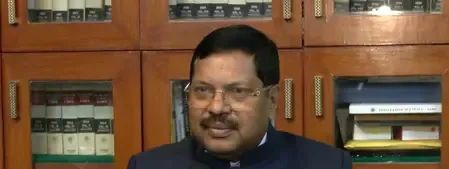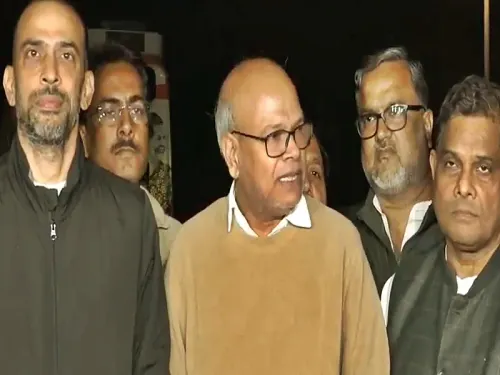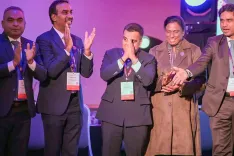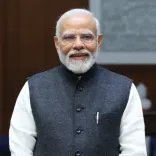Is the Constitution Under Threat? Insights from Former CJI B.R. Gavai

Synopsis
Key Takeaways
- B.R. Gavai reflects positively on his time as CJI.
- He recognizes the threats posed by social media and AI.
- Gavai emphasizes the need for judicial independence.
- He plans to work on social service post-retirement.
- The Constitution remains a foundation for justice in India.
New Delhi, Nov 27 (NationPress) Former Chief Justice of India B.R. Gavai shared his reflections on his time in the nation's highest judicial position, expressing contentment with his contributions while tackling current challenges, such as social media attacks, AI misuse, and allegations of political interference in the judiciary.
In an extensive interview with IANS following his retirement, Justice Gavai discussed constitutional values, the concept of 'bulldozer justice', the representation of women in the courts, and his future plans for social service. He firmly emphasized that courts should not serve as arenas for political battles and affirmed that India's Constitution remains intact.
Excerpts:
IANS: How do you feel about your time as CJI, and were there any goals you wished to achieve but couldn’t?
Gavai: I feel happy and fulfilled with my tenure as CJI. There isn’t anything significant that I wanted to accomplish but couldn’t.
IANS: How do you respond to social media accusations and the dangers they pose to the judiciary?
Gavai: Every branch of government, including the judiciary, faces the challenges posed by social media. Technology serves as a double-edged sword, and its misuse is a concern. A collaborative effort is essential, with Parliament taking the lead to legislate against these issues.
IANS: With the rise of AI and its potential for misuse, do you believe it's causing significant trouble? You even forgave a circulated AI video of you, showcasing your maturity.
Gavai: While technology can be beneficial, it also presents numerous drawbacks. Legislative measures should be enacted to mitigate these threats.
IANS: You’ve mentioned your intention to engage in social service after retirement. What areas are you focusing on?
Gavai: I plan to devote time to assist tribal communities in the Belghat region, with which I have a longstanding connection dating back to my father’s campaigning days.
IANS: There are rumors you might continue your father's legacy in politics?
Gavai: Currently, I have no plans to enter politics. I’m taking this time to relax after years of service, and once I feel ready, I’ll consider my options.
IANS: Is it inappropriate for someone to take on roles after retirement?
Gavai: I haven’t stated that taking on post-retirement roles is wrong. It’s a personal choice. After decades in the judiciary, if someone believes their experience could benefit an institution, that’s acceptable. However, I’ve consistently said I won’t accept any governmental position after retirement.
IANS: You delivered a landmark judgment regarding 'bulldozer justice', yet some states are not adhering to it. Shouldn’t stricter actions be enforced?
Gavai: The focus should be on implementation. Our ruling clearly stated that violations would lead to strict consequences, and citizens have the right to appeal to the high court regarding grievances.
IANS: With Constitution Day just passed, what is your view on Baba Saheb Ambedkar's vision and constitutional principles?
Gavai: I hail from modest beginnings, and my father was a strong advocate of Ambedkar's teachings. My achievements stem from his principles and the Indian Constitution. Ambedkar envisioned political, social, and economic justice, asserting that democracy necessitates all three forms of justice. Therefore, the three arms of government must collaborate to ensure justice is accessible to every citizen.
IANS: Is Ambedkar’s Constitution facing threats?
Gavai: No, I don’t believe that to be true.
IANS: Some political figures argue that the Constitution is under threat. What’s your perspective?
Gavai: I disagree. The Kesavananda Bharati judgment of 1973 is explicit in stating that Parliament cannot alter the 'basic structure' of the Constitution, which remains unchangeable. If anyone suggests otherwise, I find it unjust.
IANS: Many laud your historic rulings, yet some social media users label you as anti-Sanatan. How do you respond to this trolling?
Gavai: I avoid social media. I have never made disparaging comments about Lord Vishnu; those were misconstrued. Judicial decisions must be based on facts and the law, not social media trends.
IANS: Is there government interference in the judiciary, particularly regarding judge transfers?
Gavai: That is incorrect. The government does not meddle in judicial matters. The Collegium considers various inputs, including those from the executive, but operates independently.
IANS: Regarding the Justice Yashwant Verma case?
Gavai: While I was in Kenya at the time, an inquiry committee led by a Supreme Court judge is currently reviewing the situation. It’s not appropriate for me to comment further.
IANS: Current CJI Surya Kant mentioned the pollution crisis in Delhi. Is judicial intervention the remedy?
Gavai: No, the judiciary can issue orders, but the responsibility for implementation lies with the executive. The current pollution control machinery lacks the necessary resources.
IANS: There are instances of the judiciary being drawn into political matters. How do you perceive this trend?
Gavai: I have consistently maintained that the judiciary should not be a battleground for political disputes. Such matters should be addressed at the ballot box, not in court.
Numerous cases have arisen involving politicians, and I have been clear that neither central nor state investigative bodies should be weaponized for political ends. During my tenure, I handled cases involving prominent politicians and ensured that the investigative process remained impartial.
IANS: What are your thoughts on Prime Minister Narendra Modi’s visit to former CJI D.Y. Chandrachud?
Gavai: I prefer not to comment on individual cases. The judiciary, legislature, and executive work independently to serve the citizens and must operate within their respective domains.
IANS: Should judges face criticism?
Gavai: Constructive criticism of judgments is welcome, but personal attacks and trolling against judges are unjustified.
IANS: What’s your view on the representation of women in the judiciary?
Gavai: Women’s representation must be enhanced. Recent data indicates significant appointments of women during my tenure, and I believe their presence is growing in the judicial system.
IANS: What message do you have for the judiciary’s improvement?
Gavai: I believe judges, past and present, are well-informed and dedicated to fulfilling their responsibilities for the betterment of the institution and the nation.
IANS: What’s your perspective on Maoism?
Gavai: I’m pleased to see a decline in Maoism across various regions. Places like Gadchiroli in Maharashtra have witnessed substantial reductions in such activity.









